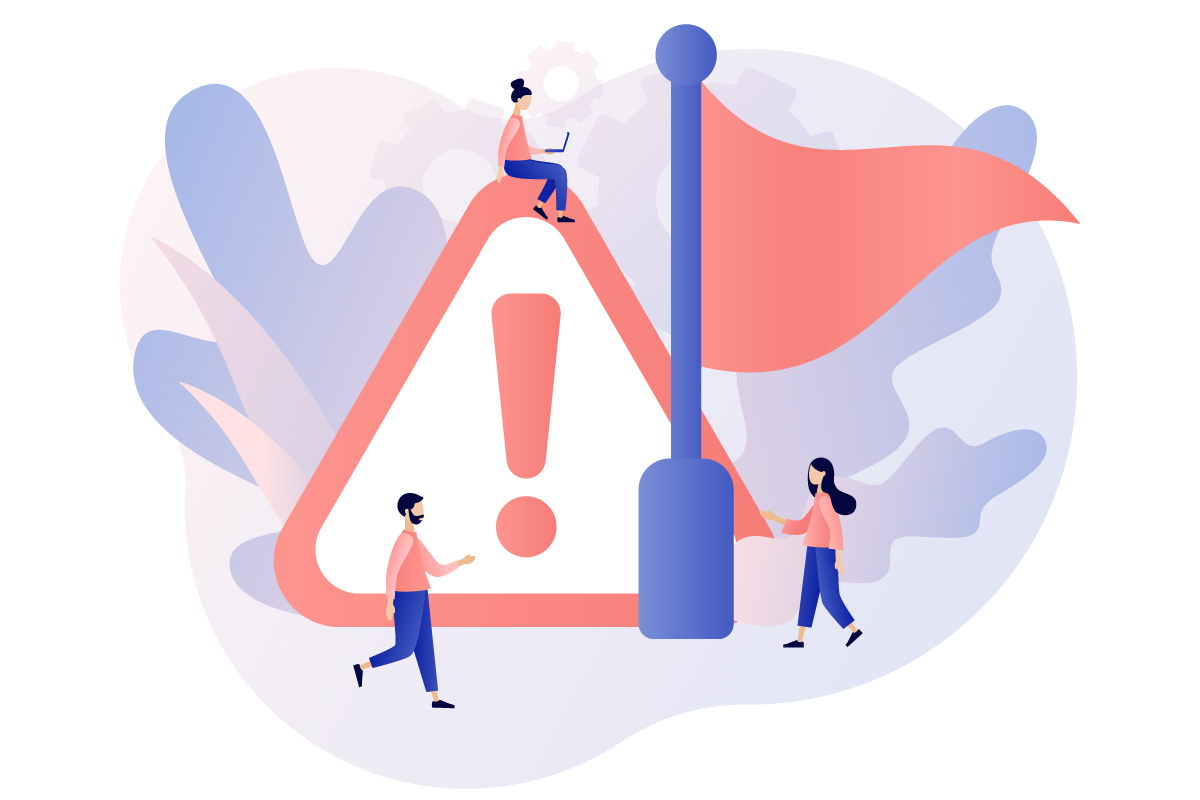Prospecting is a balancing act. You want your team to fill their calendars with as many meetings as possible. But these opportunities have to be the right fit. You don’t want your sales professionals to invest time in prospects who aren’t going to progress.
Failure to qualify prospects properly has a big downside. According to The Brooks Group research, almost half of underperforming teams struggle with qualifying new opportunities. And if you’re not qualifying the right people, you have a much lower chance of closing the deal.
When your sellers reach out to potential customers, it’s essential for them to check off the five characteristics of a qualified prospect. Just because they can sell to someone doesn’t always mean they should. Consider the potential value of the deal relative to the value of your offerings to determine whether you can sell and service the account profitably.
It’s also critical for your sellers to look for common red flags—warning signs that suggest a particular customer is not worth a seller’s time. By being aware of these red flags, they’ll be able to save themselves valuable time and effort. Share these tips with your sales team to help them focus on the right opportunities.
1. Lack of Interest
One of the most blatant warning signs a prospect isn’t interested in doing business with you is when they show little interest in what you have to say. The customer will avoid eye contact, fidget, or seem preoccupied. If you see a customer displaying any of these tendencies, it’s time to move on to another opportunity.
2. Unresponsiveness
Another warning sign is when a prospect doesn’t respond to your efforts to communicate with them. If the customer doesn’t answer email or return calls from your sales team, this indicates they’re not ready to move to the next stage of the sales process. The same goes for customers who are difficult to schedule meetings with. Picking up on this early ensures you don’t annoy the prospect.
3. Being Hard to Pin Down
A third red flag is when a prospect gives evasive answers to your questions. If the customer avoids answering straightforward questions, changes the topic, or seems apprehensive, these are all possible indicators they’re not ready to move ahead. Avoidance is a telling sign the customer may not be as invested as you are.
4. Stand-Offishness
Another warning sign you may encounter is a prospect who responds to your questions or statements with an angry tone. It’s possible the customer is trying to tell you they’re not ready by disagreeing with everything you say, being skeptical of your ideas, or becoming confrontational.
5. Being Overly Demanding
When a prospect requests something you consider unreasonable—a discount, freebie, or add-on—that’s another red flag. Making demands that are impossible to fulfill, expecting too much, attempting to force a transaction, or acting entitled shows they’re not ready to buy.
6. Disrespect
Another sign is a prospect who is impolite or condescending toward you. The customer who talks over you, interrupts you, or completely ignores your suggestions is unpleasant and possibly worse. While some individuals just have a brusque personality, prospects who are consistently rude are probably not a good fit.
7. Manipulative Behavior
Look out for prospects who try to manipulate the discussion in any way by bringing up competitors or withholding information. The customer is signaling they’re not ready to buy when they attempt to dominate the discussion, give hazy replies, change their story, or come across as fake.
8. Lack of Professionalism
One additional sign a prospect isn’t a good fit for your company is a lack of professional behavior. While rapport is crucial, so is respect. If the potential customer is cursing, disregarding conversational norms, or behaving in a manner that isn’t acceptable, it may be best to cut ties entirely. Noting this early can help reduce the chances of it getting to this point.
Know the 5 Characteristics of a Qualified Prospect
Qualifying prospects before they progress to the next stage of the sales pipeline is critical for reducing wasted time and increasing forecast accuracy. Make sure your sales professionals know the five characteristics of a prospect who’s worth pursuing.
- Awareness of Need: Prospect is aware that they have a problem.
- Authority: Prospect has authority to take action or influence the decision-making process.
- Sense of Urgency: Prospect has a timeline and feels the clock is ticking.
- Trust: Prospect feels they can rely on you and they believe you’re credible.
- Willingness to Listen: Prospect is open to engaging in a two-way communication about solutions.
Develop Prospecting Skills
Most sales teams struggle with how to qualify prospects, even those who are meeting goals. Prioritizing qualification skills will pay off in the short and long term. When your sales professionals can identify and nurture highly qualified prospects, the rest of the sales process is more productive.
Don’t overlook this area of opportunity to help your sales professionals differentiate themselves and connect with highly qualified buyers. Find out how our Prospecting Strategies workshop can help your sales team improve their prospecting results.




